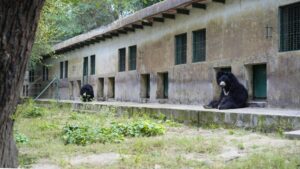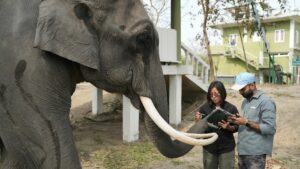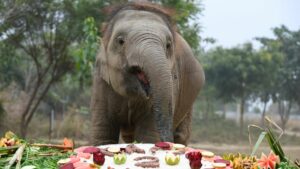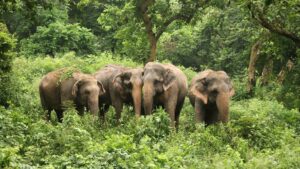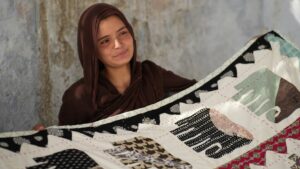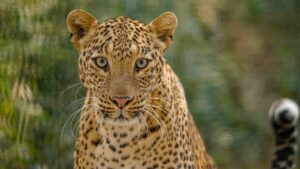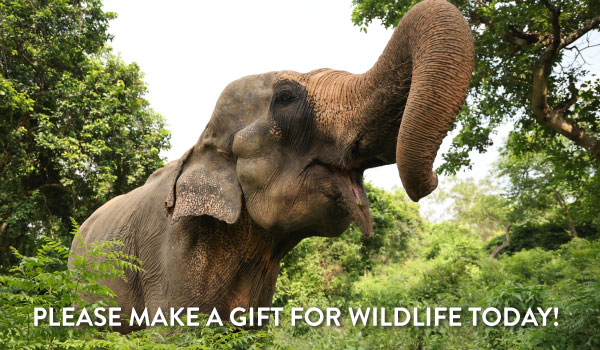At the heart of wildlife conservation lies a simple truth: people protect what they understand. When communities, students, policymakers, and businesses become aware of the intricate balance between humans and nature, their willingness and ability to act increases manifold.
For Wildlife SOS, every rescue, rehabilitation, and conservation milestone becomes even more impactful when supported by the ripple of awareness from forests, fields, and rescue centres.
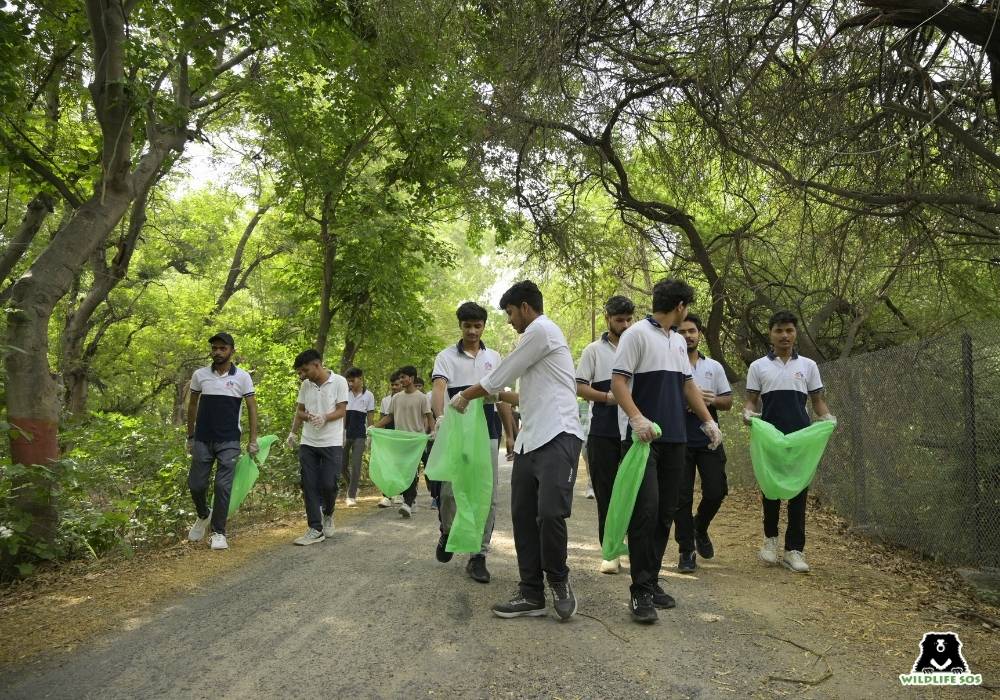
- Volunteers join hands with Wildlife SOS to clean and restore natural habitats, promoting a safer environment for both people and wildlife. [Photo © Wildlife SOS]
The months of April through June 2025 had several effective events organised. During this quarter, Wildlife SOS intensified its awareness and outreach efforts across India through dynamic educational programmes, community workshops, expert-led training, collaborative clean-up drives, and a thought-provoking webinar. Titled ‘Desertification Isn’t a Desert Problem — It’s Ours’, the exclusive online session on June 17 unpacked how desertification and drought are impacting lives, livelihoods, and ecosystems and what each of us can do to be part of the solution. With insights from conservation experts and real-world examples, the webinar inspired participants to take action before it’s too late.
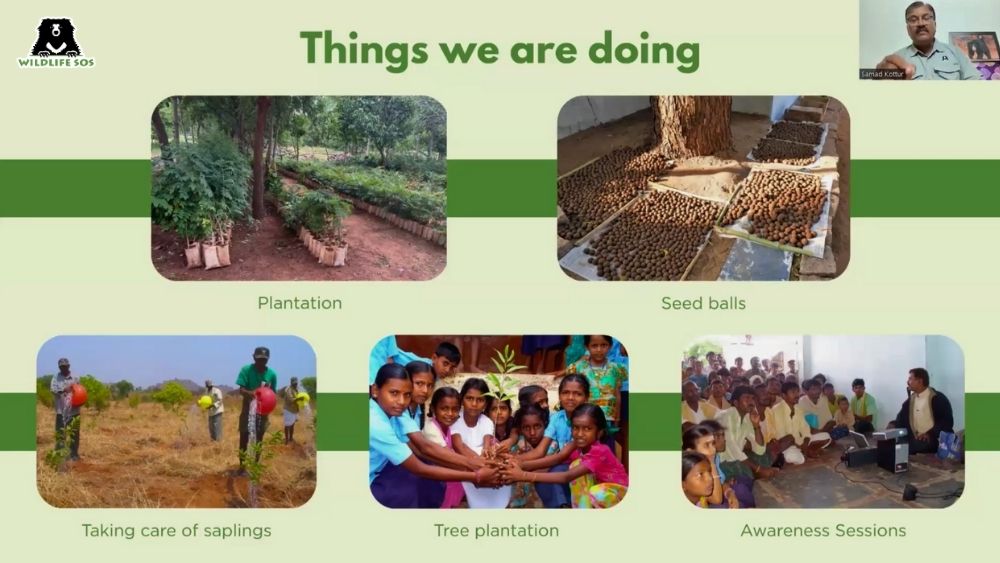
- A snippet from our webinar on desertification, where experts shared insights on restoring ecosystems and safeguarding the planet. [Photo © Wildlife SOS]
These initiatives didn’t just educate, they empowered people to view conservation as a shared responsibility and inspired them to become advocates for coexistence. From engaging young minds to equipping forest officials and strengthening bonds with communities on the edge of human-wildlife conflict-prone areas, our diverse team made sure that the message of coexistence and compassion was spreading all around.
Here’s looking back at what Wildlife SOS’s awareness and outreach initiatives over these three months were.
Karnataka
Wildlife SOS fostered awareness and community participation in Bangalore through a series of meaningful events. April 19 saw the participation of 60 students from Zoo Club — a group of children eager to learn about wildlife — at Bannerghatta Bear Rescue Centre (BBRC). This educational initiative brought together young minds for a guided tour of the BBRC, where they were enriched with knowledge of rescued sloth bears and valuable insights about the wild. BBRC also hosted a Zoo Summer Camp on May 6 for students from various schools, engaging them in an interesting session on sloth bears and other species. The next day, on May 7, Wildlife SOS partnered with tech giant Western Digital for a large-scale seed ball-making event at the Bangalore office. In two lively sessions, 80 enthusiastic employees learned about reforestation and made hundreds of seed balls after presentations on elephant and sloth bear conservation were given.
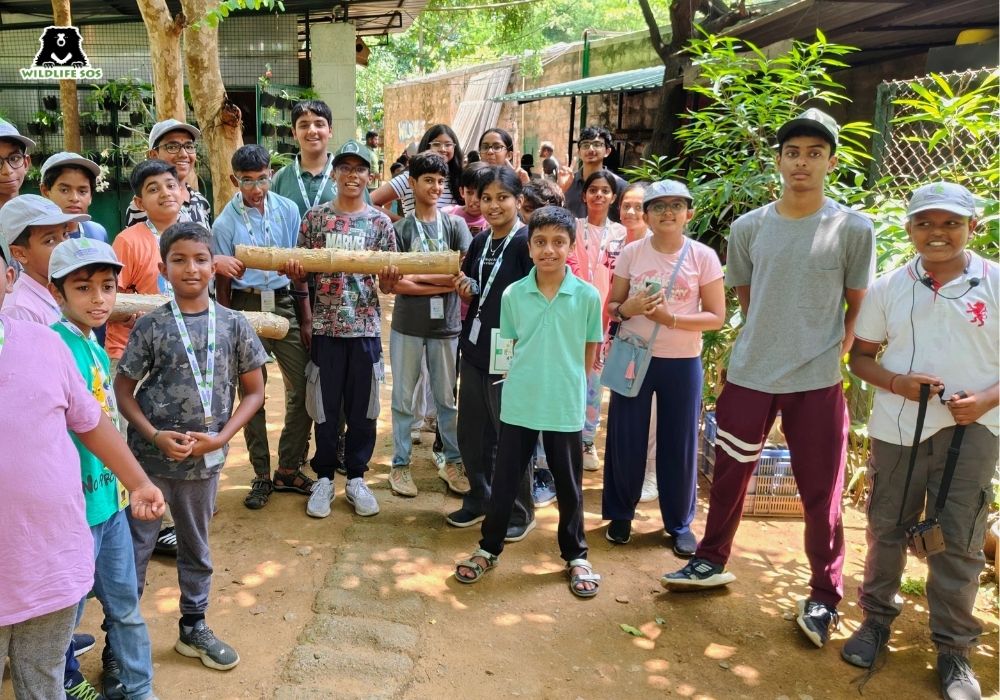
- Young minds from Zoo Club explore wildlife conservation through interactive sessions, fostering curiosity and compassion for animals. [Photo © Wildlife SOS]
For World Environment Day on June 5, the team conducted an extensive programme at Greenwood High School. Younger students created drawings, while those from grades 5 to 8 took a pledge against plastic pollution after a quiz and presentation on its impact on wildlife. Volunteers from Titan Company assisted in hammock making, enclosure cleaning and enrichment making activities at BBRC on June 6. On June 16, the Wildlife SOS team visited Shillindradoddi Government School to conduct an awareness session in the local language of Kannada, where an educational video on sloth bears and leopards that resonated with students from forest-dwelling families was also screened. The students then engaged in a drawing activity after the sessions.
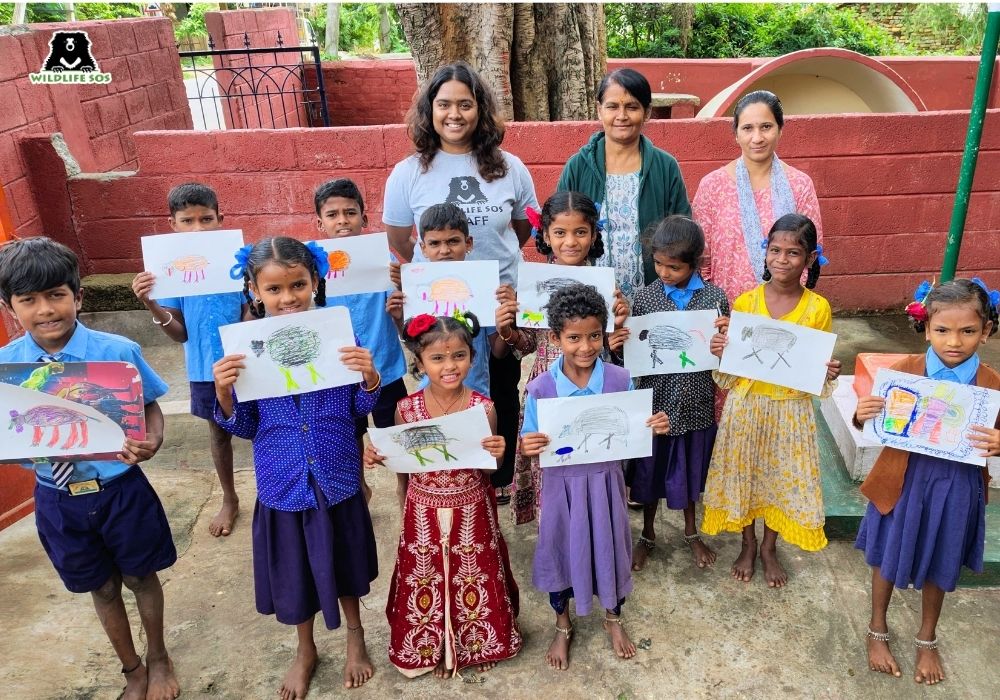
- Students of Shillindradoddi Government School made drawings of wildlife after learning about coexistence and the importance of protecting nature. [Photo © Wildlife SOS]
On June 28, BBRC launched an eco-club initiative at Ramakrishna Mission School. The programme began with a forest walk and an interactive session on Bannerghatta’s biodiversity, and will now carry on with planned activities every Saturday. Adding momentum to our outreach events, seed ball making sessions were held at Wipro, a technology services and consulting company, on June 18 and 25, engaging corporate volunteers in restoring ecosystems.
Through these thoughtfully designed school, corporate, and community engagements, the Bangalore team combined education, action, and awareness to inspire lasting change.
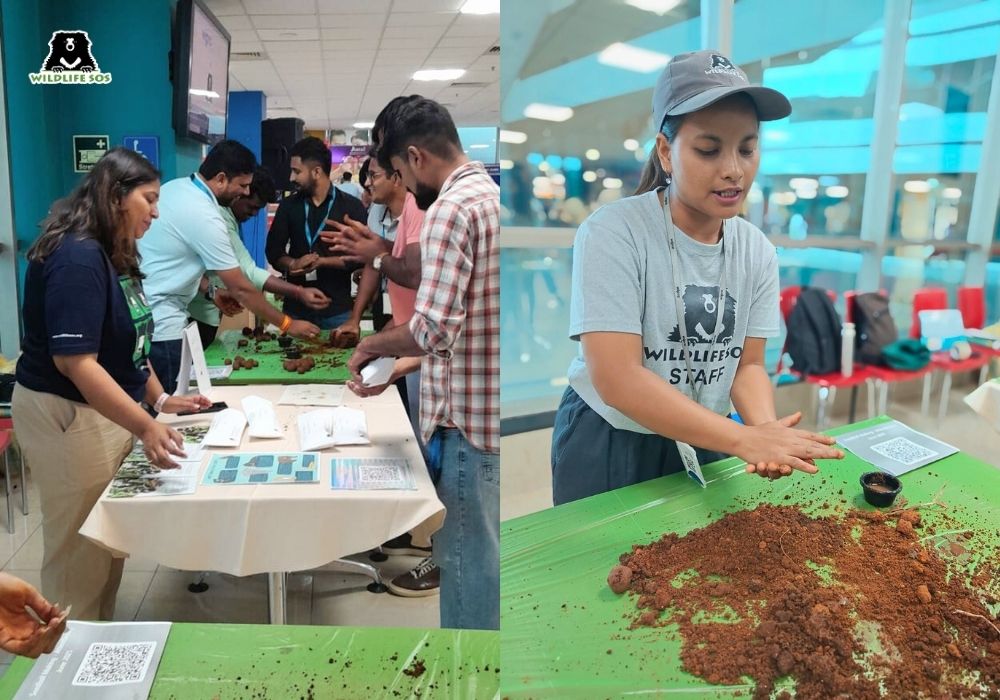
- Employees from Wipro shaped seed balls with Wildlife SOS, pledging to revive native greenery and create habitats for wildlife. [Photo © Wildlife SOS]
Maharashtra
In Maharashtra, Wildlife SOS focused on preparing frontline forest personnel for real-world challenges in human-wildlife conflict zones. At the Manikdoh Leopard Rescue Centre (MLRC), six specialised training programmes were conducted in May and June for trainee forest guards from across the state. On May 12, 13, and 29, MLRC welcomed trainees from the Jalna, Chandrapur, and Kundal Forest Academies, respectively, followed by additional batches from Shahapur, Chandrapur, and Pal Academies on June 2, 4, and 12. Each session, led by Mr. Mahendra Dhore, Centre Head of MLRC, focused on ethical rescue practices, understanding leopard behaviour, and techniques for safely diffusing human-leopard encounters. Special emphasis was placed on sensitively engaging communities and promoting coexistence. These workshops strengthened the state’s capacity to manage wildlife emergencies, ensuring the next generation of forest officers are both informed and empathetic stewards of conservation.
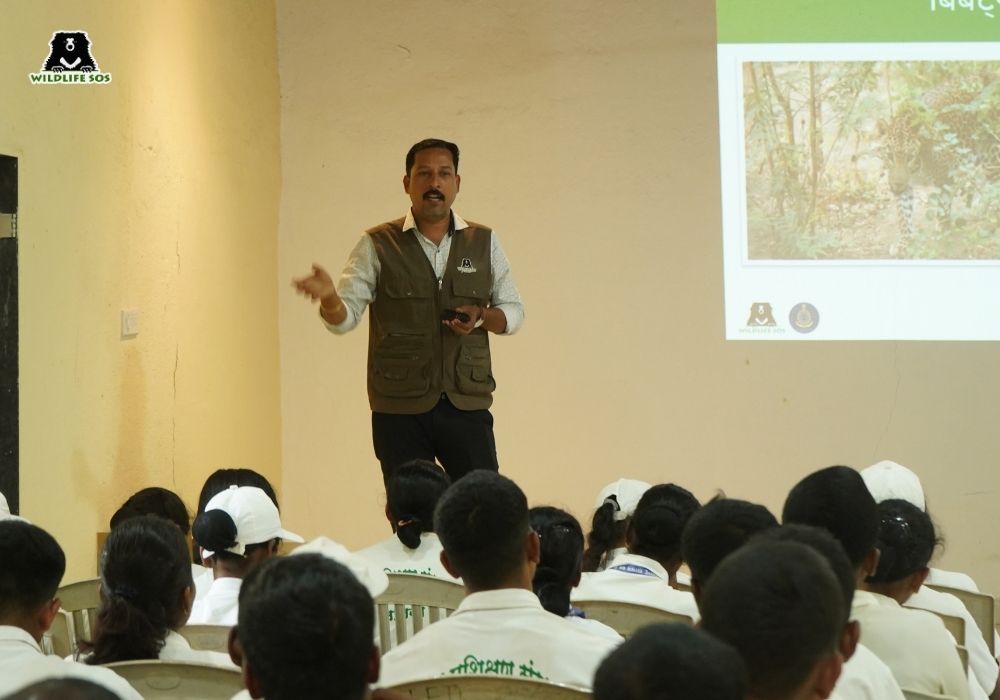
- Mr. Mahendra Dhore conducted a training session for forest guard trainees, emphasising ethical rescue practices and coexistence with leopards. [Photo © Wildlife SOS/ Akash Dolas]
Uttar Pradesh
Wildlife SOS conducted conservation education, law enforcement capacity building and youth engagement through sessions held at the Elephant Conservation and Care Centre (ECCC) and Agra Bear Rescue Facility (ABRF) in Uttar Pradesh. On May 30 and 31, over 90 students from Mathura Veterinary College toured both centres, learning from veterinary staff and education officers about the care of rescued elephants and bears. Trainee forest officers from Uttarakhand and Uttar Pradesh also visited for an orientation on ethical rescue practices.
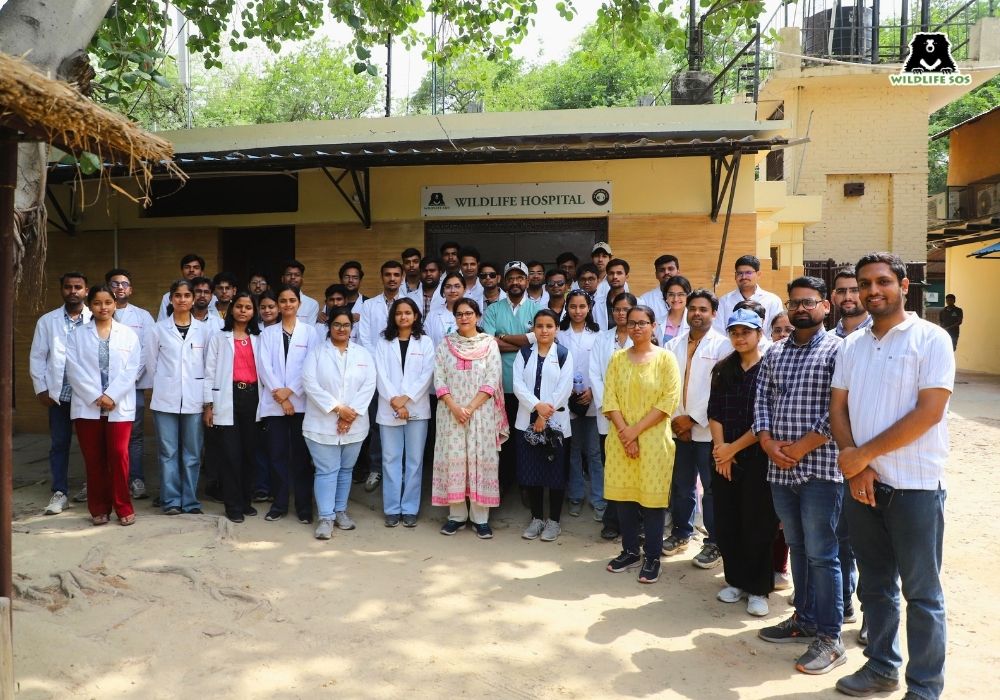
- Veterinary students from Mathura Veterinary College toured our centres to learn about the rehabilitative care given to rescued elephants and bears. [Photo © Wildlife SOS]
Students from Hindustan College of Science and Technology partnered with ECCC and ABRF and participated in a clean-up drive at the Soor Sarovar Bird Sanctuary on June 4. The participants removed harmful plastic waste while gaining education on its adverse effects on nature and wildlife. Students of different schools in Mathura participated in a drawing competition and a skit advocating for a plastic-free and wildlife-friendly future on June 5.
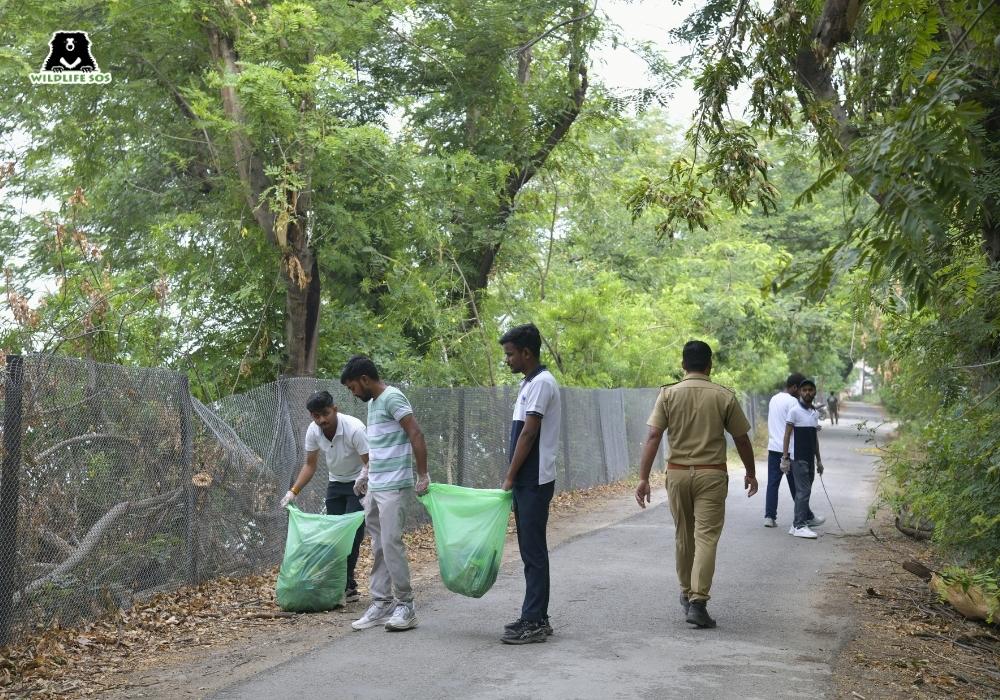
- Hindustan College of Science and Technology students joined hands with Wildlife SOS for a cleanliness drive, removing harmful plastic waste to make habitats safer for wildlife. [Photo © Wildlife SOS]
When it came to engaging the public through our awareness stalls, our team left no stone unturned. Stalls displaying merchandise created by the Kalandar community were set up at the Taj Nature Walk in Agra that took place on June 5, and at the ICCON (Indian Conservation Conference) in Dehradun, Uttarakhand, from June 25-27, sparking interesting and meaningful conversations.
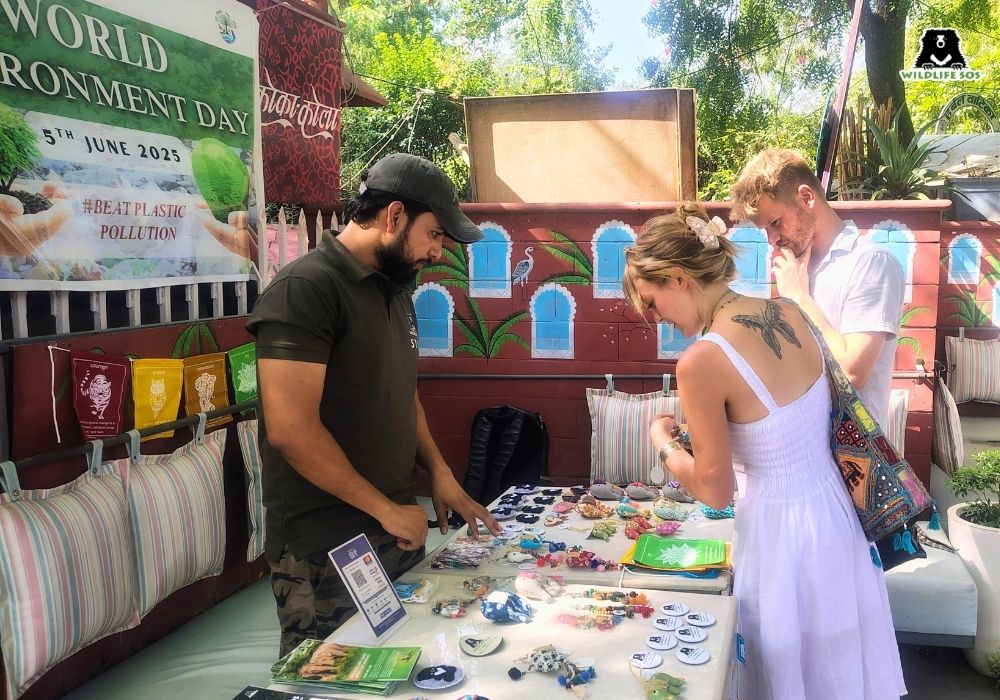
- Awareness through action — Wildlife SOS set up a stall at Taj Nature Walk in Agra to engage the public on coexistence and conservation. [Photo © Wildlife SOS]
In a landmark step to strengthen wildlife law enforcement, Wildlife SOS and the Uttar Pradesh Forest Department organised the second ‘Wildlife Crime, Investigation, and Prosecution’ workshop in Mathura on June 7. Around 100 officials from the judiciary, forest department, police, and enforcement agencies participated, with addresses from dignitaries such as Justice C.D. Singh of the Allahabad High Court and Senior Advocate Sidharth Luthra. Sessions explored gaps in enforcement, the role of forensic evidence, and strategies to improve conviction rates, with Wildlife SOS Co-founder Mr. Kartick Satyanarayan sharing key case studies from the field.
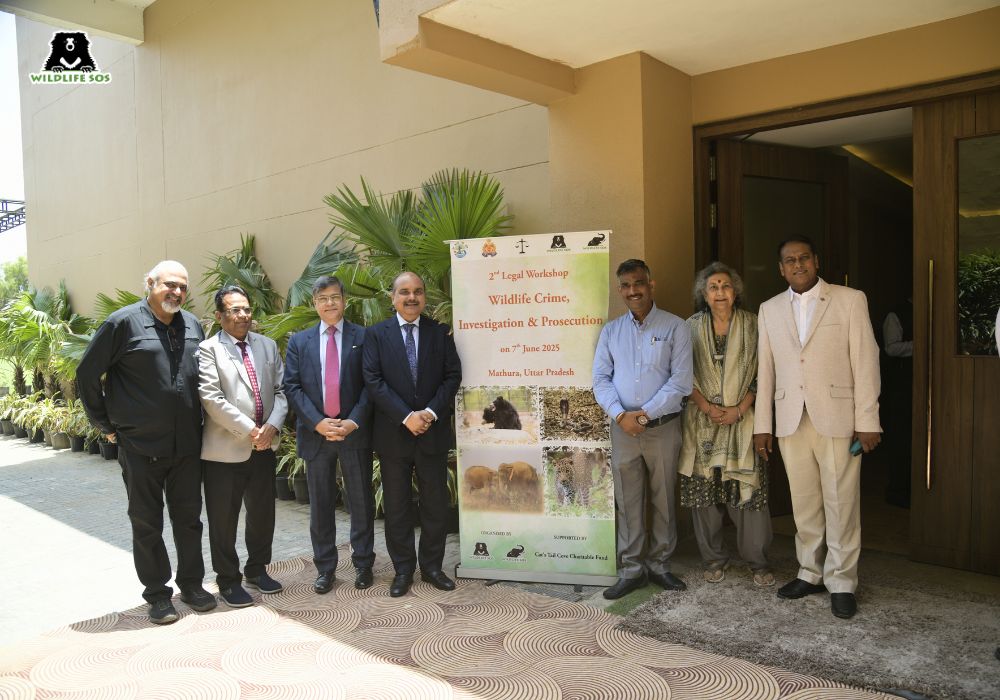
- Awareness through action — Wildlife SOS set up a stall at Taj Nature Walk in Agra to engage the public on coexistence and conservation. [Photo © Wildlife SOS]
On June 13, Wildlife SOS held a snake awareness workshop in rural Uttar Pradesh in partnership with Tuk Tuk Gilhari and Upadhyaya Foundation. The monsoon season sees a rise in snake sightings that often leads to indiscriminate killing. This session helped debunk myths, explained how to distinguish venomous from non-venomous snakes, and taught safe practices that protect both people and these vital reptiles.
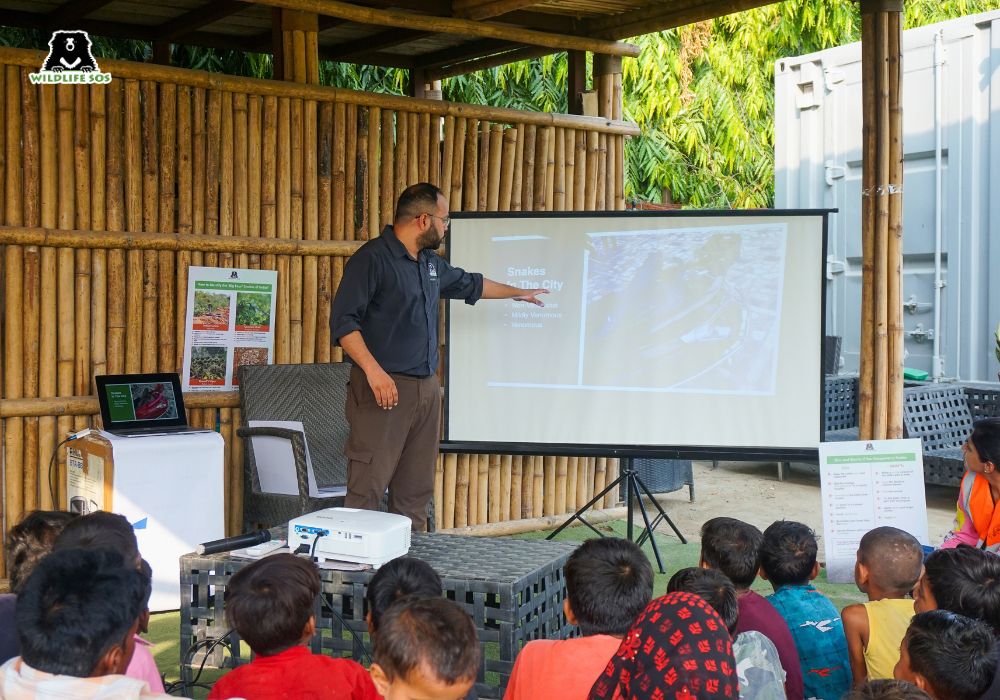
- Local farmworkers and their children engage in an interactive session on snake awareness and safety, debunking myths about wildlife. [Photo © Wildlife SOS/ Kunal Malhotra]
Jammu and Kashmir (J&K)
At the Dachigam Rescue Centre, Wildlife SOS continued its outreach among visitors, students, and local communities, highlighting Kashmir’s unique wildlife and fragile biodiversity. Led by Ms. Aaliya Mir, Wildlife SOS Education Officer and Manager in J&K, the team conducted interactive programmes with schools and colleges, inspiring curiosity and dialogue on conservation. Despite challenges posed by ongoing border tensions, Ms. Aaliya and her team remained committed to engaging communities through smaller awareness sessions that emphasised coexistence and conscientious living alongside wildlife. Each session served as an important step in fostering a deeper connection between people and Kashmir’s natural heritage.
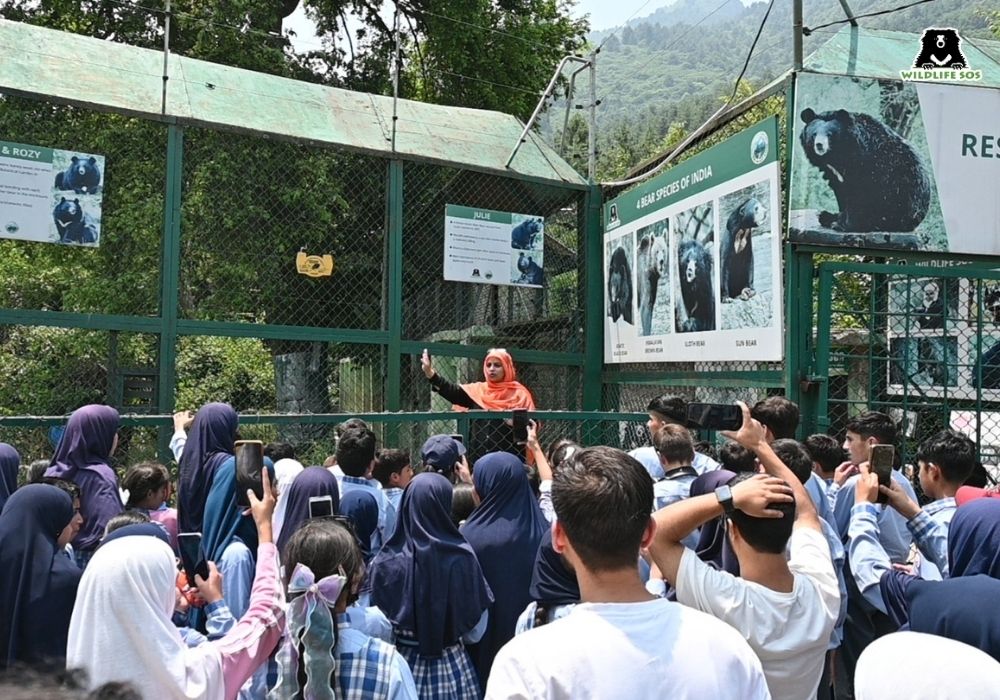
- Ms. Aaliya Mir leads an interactive awareness session to sensitise students on Kashmir’s threatened wildlife. [Photo © Wildlife SOS]
Telangana
Wildlife SOS expanded its corporate and public outreach to Hyderabad, blending creative education with hands-on activities. In April, Wildlife SOS hosted a webinar for Western Digital employees on the organisation’s journey and impact. On June 3, a seed ball-making session with employees from IBM, a multinational tech company, introduced participants to the concept of reviving barren spaces through native greenery. On June 5, World Environment Day, Wildlife SOS partnered with Wipro Cares for a seed ball making event in Hyderabad, a powerful, tactile way to restore green spaces and create microhabitats for wildlife. Participants eagerly shaped “balls of hope”, committing to India’s greenery and the animals that depend on it. Wildlife SOS also kick-started a creative business collaboration with a local café in Hyderabad, aimed at weaving wildlife conservation messaging into urban lifestyles and sparking curiosity and conversations over coffee.
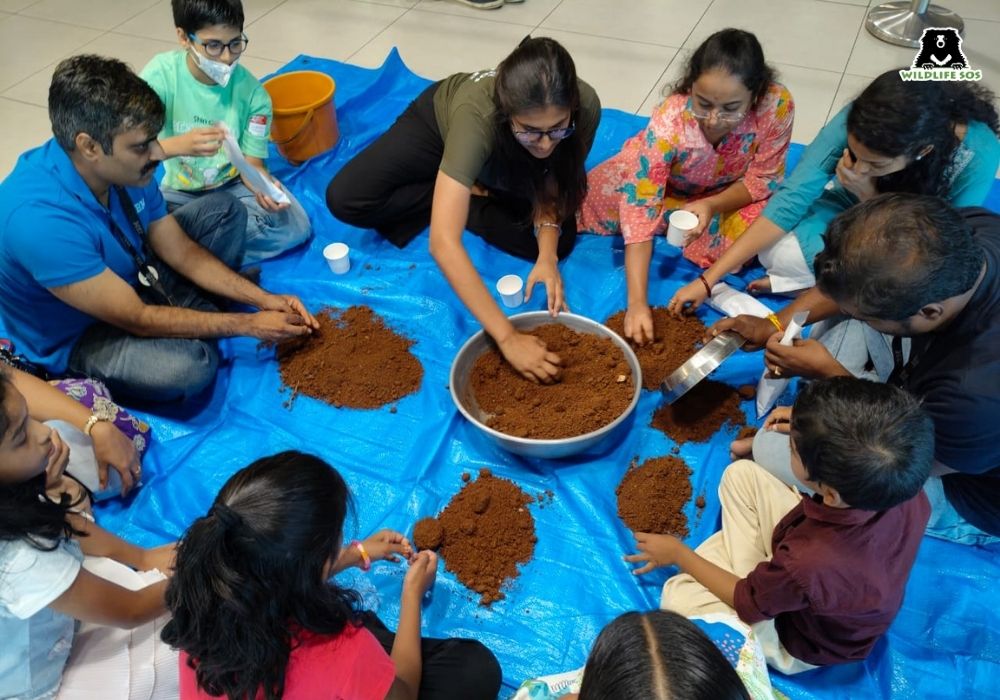
- Shaping little balls of big hope: participants from Wipro Cares join a seed ball making activity to help restore green spaces for wildlife. [Photo © Wildlife SOS]
Delhi-NCR
Merchandise-based outreach helped take the message of coexistence into public spaces. Wildlife SOS set up product stalls at DLF JPMC (April), a residential society, and DLF Mall (May), and was present for a 12-day-long period at DLF Avenue (June), engaging shoppers, residents, and visitors in dialogues about wildlife conservation. Wildlife SOS also contributed in conducting bird census with the Delhi Bird Atlas, a pioneering citizen-science initiative, with the Delhi Forest and Wildlife Department. The summer census recorded over 160 bird species, including 21 species spotted for the first time in Delhi. Wildlife SOS’s bird rescue work in Delhi remains critical, with nearly 500 birds, including endangered raptors and migratory species, already rescued by mid-2025. The census reinforced the city’s rich biodiversity and the role of citizens in conservation.
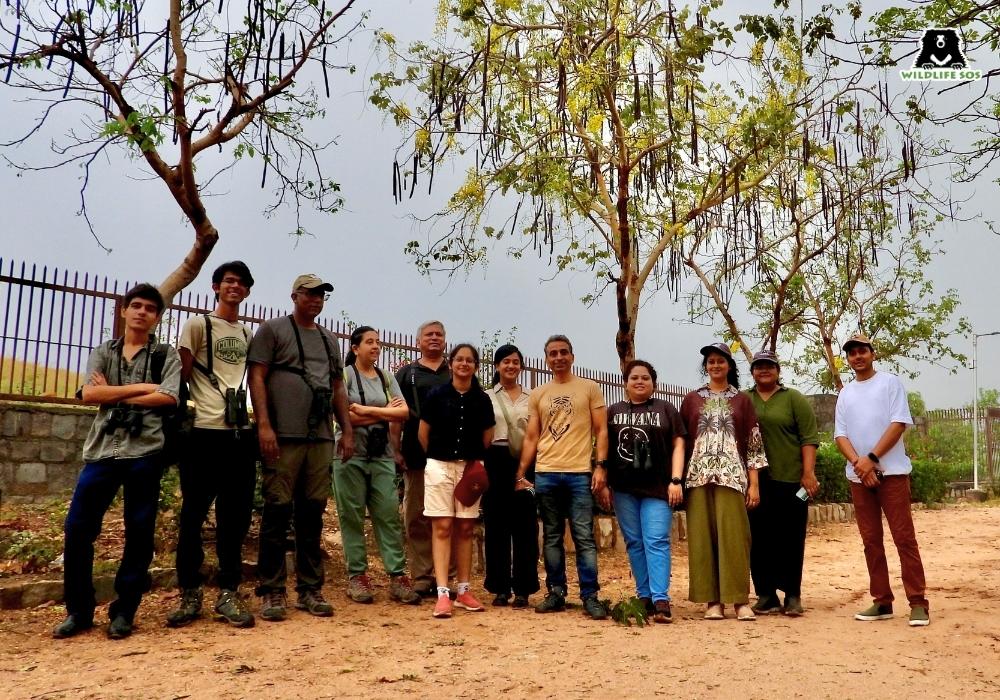
- Volunteers and experts documented bird sightings as part of the census with Delhi Bird Atlas, highlighting the capital’s rich and diverse avifauna. [Photo © Wildlife SOS]
Gujarat
In Gujarat, the Wildlife SOS-GSPCA (Gujarat Society for Prevention of Cruelty to Animals) team conducted five awareness programmes during the quarter, engaging both National Disaster Response Force (NDRF) trainees and school students. These interactive sessions focused on the ecological importance of snakes, safe rescue practices, and the broader significance of wildlife conservation. One of the highlights was a thought-provoking talk for students during a show where pets were brought in too. The talk highlighted how animals belonging to the wild are confined in cages harmful for them, and therefore should never be considered as pets. Participants were also informed about the authorities whom they can report cases of animals in distress, ensuring timely and ethical interventions. Through these initiatives, the team inspired communities to see wildlife not as threats or curiosities, but as vital parts of a shared ecosystem deserving of respect and protection.
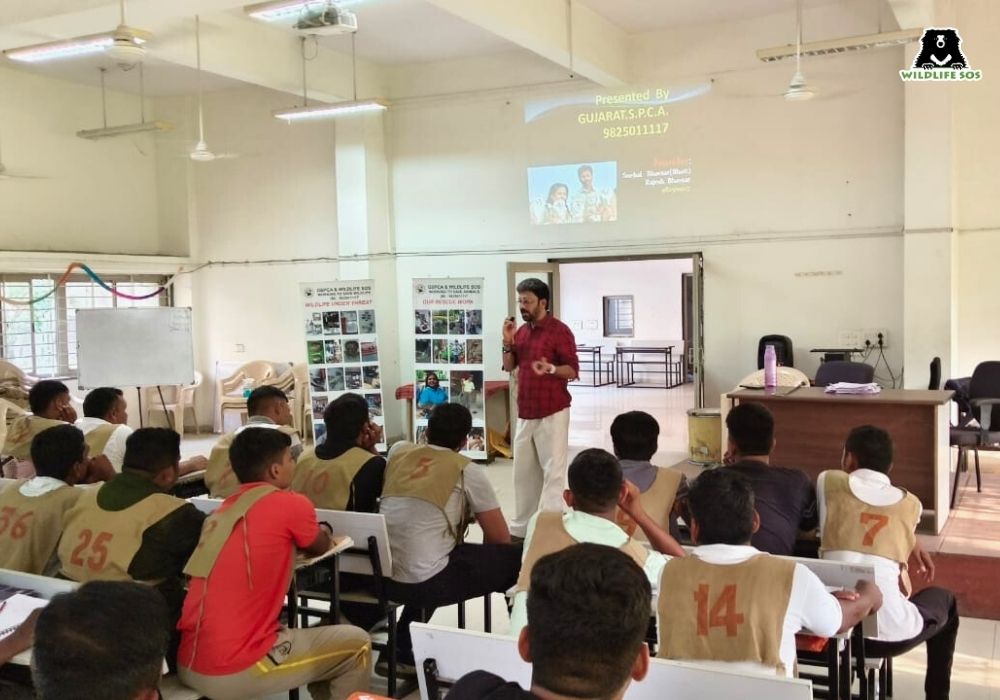
- The Wildlife SOS-GSPCA team consistently spreads awareness about wildlife protection, inspiring communities to coexist with nature. [Photo © Wildlife SOS]
These diverse and thought-provoking initiatives are a reminder that conservation is not merely about protecting wildlife; it is also about how we can build bridges between people and nature. By blending awareness, inspiring people and strengthening communities, Wildlife SOS continues to turn knowledge into impact. Every mind touched, every thought sparked, every myth busted brings us one step nearer to a future where humans and wildlife can coexist, thriving in harmony. It is by uniting towards this cause that we can keep the spirit of coexistence kindled in our hearts and in our actions.
If you would like to connect with Wildlife SOS to hold informative awareness sessions at your school, university or workplace, kindly email us at education@wildlifesos.org.
Feature image: Kunal Malhotra/ Wildlife SOS

